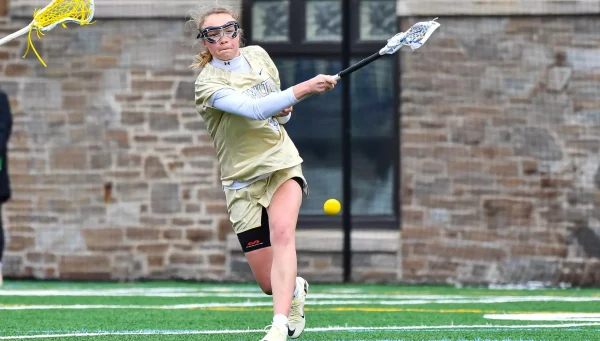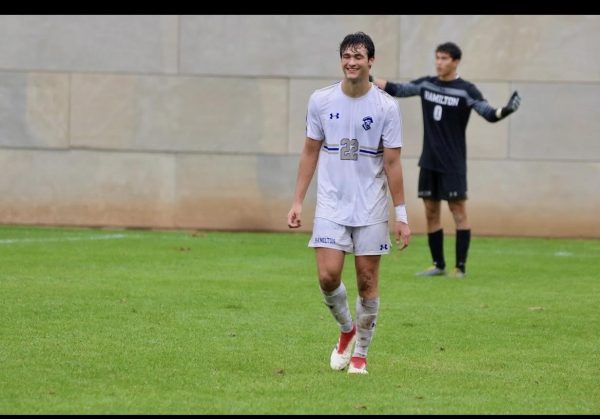
Sarah Stonestreet ’25
At Hamilton, Stonestreet played both varsity lacrosse and squash. Though Stonestreet was recruited for lacrosse, she also chose to join the squash team to stay connected to a sport she always enjoyed.
Stonestreet appreciated the contrast between squash and lacrosse, particularly the different ways they were played and the lessons they taught. Squash, a racket sport played one-on-one, emphasized individuality and taught her mental toughness, self-reliance and independence. In contrast, lacrosse—a fast-paced field sport—fostered teamwork, leadership and a sense of shared responsibility.
Reflecting on her squash experience, Stonestreet emphasized the intensity of practices. Matches in practice between her teammates determined the nine spots available for gameday, and Stonestreet often entered games as Hamilton’s top-ranked player. Despite the competitive nature of practices, the squash team remained very close and supportive. Stonestreet explained how her coach and teammates emphasized sportsmanship, creating an environment where players pushed each other to improve while still celebrating each other’s success. Stonestreet described squash as both a “social” and “life” sport and looks forward to continuing it recreationally in New York City after graduation.
Being a collegiate athlete is demanding on its own, but balancing two sports with Hamilton’s academic rigor takes it to another level. Stonestreet managed both, excelling in the classroom while staying committed to both her teams. In fact, Stonestreet saw the bright side to her demanding workload, describing how her days were “more structured and more productive.”
When asked about her favorite memory as a Hamilton athlete, Stonestreet didn’t mention a specific game or win. “It was the relationships I built—ones that will last far beyond my time at Hamilton,” she said.
Tommy Kantrowitz ’25
Playing left back for the Men’s Soccer team, Kantrowitz reflected on his time at Hamilton, describing the experience of being a student-athlete as “extremely rewarding.”
First and foremost, he emphasized the evolving culture of the soccer team, which had strengthened significantly since his freshman year and fostered strong unity across all class years. Notably, Kantrowitz explained that the team embraced a non-hierarchical approach to leadership, where every player had a voice—not just the captains. He also highlighted the team’s commitment to constructive feedback, saying the culture “taught you how to learn from others.” This dynamic contributed to the team’s cohesion and camaraderie. Their tight-knit bond was reflected in fun team rituals—one favorite tradition involved playing “Dog Days Are Over” by Florence & The Machine as the last song before the coaches entered the locker room.
Kantrowitz also spoke fondly about the relationships he built with his teammates, describing them as “built-in best friends” on and off the field. Kantrowitz later said that one of his favorite memories as a student-athlete were the locker room late nights. Typically, these were late nights after practices, when he and a few close teammates lingered in the locker room long after everyone else had gone—laughing, unwinding and making their way to the trainer, savoring those moments together.
When asked about his favorite memory on the field, not only did Kantrowitz remark on winning the NCAA Championship first-round match against Calvin University, but he also stated that he will never forget the emotional final game of his career—a second-round penalty shootout loss to Kenyon College. Kantrowitz highlighted the penalty-shootout, detailing that there were over 1000 fans in attendance and embracing his teammates in the shootout at midfield was magical. Regardless of the result, it was a rewarding ending to his prolific collegiate-career. At the end, he further mentioned that he was one of the players to take a penalty, of which he scored. “Bottom right every time,” Kantrowitz said.
Brian Healy ’25
Having played golf since he was young, Healy continued his passion at Hamilton. Reflecting on his four years with the team, he highlighted his deep love for the camaraderie it fostered.
Healy explained that being part of a smaller athletics team at Hamilton allowed him to truly get to know his teammates, bringing them closer together. Due to limited roster spots for golf tournaments, the team would determine who played based on weekly performance. When asked if this created a more tense atmosphere, Healy pointed out that it actually strengthened the bond among the team, especially as they improved over the years and practices became more competitive. Instead of competing against one another in a cutthroat manner, Healy explained that the golf team supported each other, with competition taking the form of playful remarks rather than rivalry.
Characterizing his experience as a student-athlete, Healy emphasized that being on the golf team taught him “time management and discipline,” pushing him to stay academically productive during the season.
Ultimately, Healy shared that he will most remember his senior year, as this year’s team was “built around a strong group of individuals dedicated to prioritizing the success of the team.”
